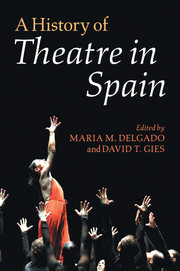Book contents
- Frontmatter
- Contents
- Illustrations
- Contributors
- Acknowledgements
- Introduction
- 1 The challenges of historiography
- 2 Lope de Vega, Calderón de la Barca and Tirso de Molina
- 3 The world as a stage
- 4 Playing the palace
- 5 The art of the actor, 1565–1833
- 6 Theatrical infrastructures, dramatic production and performance, 1700–1759
- 7 Popular theatre and the Spanish stage, 1737–1798
- 8 Theatre of the elites, neoclassicism and the Enlightenment, 1750–1808
- 9 Actors and agency in the modern era, 1801–2010
- 10 Zarzuela
- 11 Nineteenth-century Spanish theatre
- 12 Copyright, buildings, spaces and the nineteenth-century stage
- 13 Modernism and the avant-garde in fin-de-siècle Barcelona and Madrid
- 14 Continuity and innovation in Spanish theatre, 1900–1936
- 15 Theatrical activities during the Spanish Civil War, 1936–1939
- 16 Theatre, colonialism, exile and the Americas
- 17 Theatre under Franco (1939–1975)
- 18 Flamenco
- 19 Nationalism, identity and the theatre across the Spanish state in the democratic era, 1975–2010
- 20 Directors and the Spanish stage, 1823–2010
- 21 This evolution is still ongoing
- 22 Theatre as a process of discovery
- 23 Theatre is the art of the future
- Select bibliography
- Index
22 - Theatre as a process of discovery
Published online by Cambridge University Press: 05 June 2012
- Frontmatter
- Contents
- Illustrations
- Contributors
- Acknowledgements
- Introduction
- 1 The challenges of historiography
- 2 Lope de Vega, Calderón de la Barca and Tirso de Molina
- 3 The world as a stage
- 4 Playing the palace
- 5 The art of the actor, 1565–1833
- 6 Theatrical infrastructures, dramatic production and performance, 1700–1759
- 7 Popular theatre and the Spanish stage, 1737–1798
- 8 Theatre of the elites, neoclassicism and the Enlightenment, 1750–1808
- 9 Actors and agency in the modern era, 1801–2010
- 10 Zarzuela
- 11 Nineteenth-century Spanish theatre
- 12 Copyright, buildings, spaces and the nineteenth-century stage
- 13 Modernism and the avant-garde in fin-de-siècle Barcelona and Madrid
- 14 Continuity and innovation in Spanish theatre, 1900–1936
- 15 Theatrical activities during the Spanish Civil War, 1936–1939
- 16 Theatre, colonialism, exile and the Americas
- 17 Theatre under Franco (1939–1975)
- 18 Flamenco
- 19 Nationalism, identity and the theatre across the Spanish state in the democratic era, 1975–2010
- 20 Directors and the Spanish stage, 1823–2010
- 21 This evolution is still ongoing
- 22 Theatre as a process of discovery
- 23 Theatre is the art of the future
- Select bibliography
- Index
Summary
Are there figures in Spanish theatre history that you feel stand out for any particular reason?
I think that – speaking of playwrights and above all of texts – Spanish theatre shares a similar history with French or English theatre. During the seventeenth century they each created their own poetics that, in turn, engendered particular performative systems; they created spaces and theatrical designs in order to generate a new relationship with the spectator. This is not really the case in the rest of Europe.
From that tradition, there are above all the two greats, who are Lope de Vega and Calderón de la Barca. I would also, however, add a third, Cervantes. Although he is perhaps not as significant a playwright as he was a novelist – and never really cultivated theatre in the mode of Lope de Vega and Calderón – he is possibly more modern than the other two. Most of his theatre is in prose and does not stick to the rules of verse that are part of baroque theatre; this grants his work a sense of liberty.
To the great Golden Age theatre we can add two authors of the twentieth century, who are [Ramón María del] Valle-Inclán and [Federico García] Lorca. Neither of them, for various reasons – and this differs from what happened in Russia, for instance – managed to create a school or a performance system. They possessed their own poetics, but they did not create a pedagogical methodology. Valle-Inclán, for all his greatness, suffered from a flaw that the theatre never forgives: he was ahead of his time. His writing, as a true renovator of Castilian, does not adapt to the rhetorical and empty late-Romantic style employed by most Spanish actors of the time.
- Type
- Chapter
- Information
- A History of Theatre in Spain , pp. 466 - 477Publisher: Cambridge University PressPrint publication year: 2012



